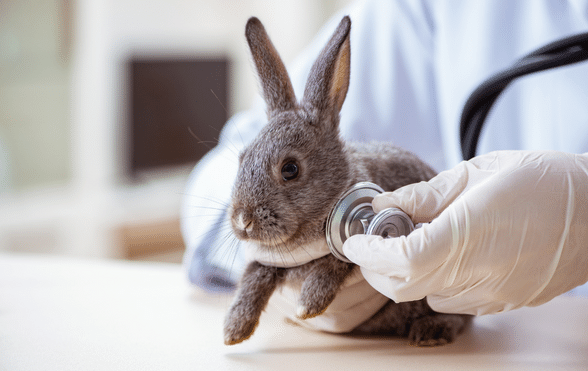What to expect if you need to visit a vet during the coronavirus outbreak.
Even though we’re in the midst of the coronavirus outbreak, this won’t stop our pets becoming poorly, and it won’t stop us worrying about them.
Visiting a vet at this time is very different to what we’re used to. And it’s likely we’re going to settle into a ‘new normal’.
The British Veterinary Association have been offering guidance to vet practices on how they can best help pets and owners, while staying safe.
These are the latest updates as provided by the BVA and the Royal College of Veterinary Surgeons.
Update on 13/07/20: According to the most recent RCVS survey, 32% of practices reported a near normal caseload with 6% reporting they were back to business as usual.
Only 4% of practices reported they were seeing emergencies only, so it is safe to say that access to regular veterinary services is still improving and quite close to ‘normal’.
RCVS advise that you should not be afraid to contact your usual veterinary practice first. If you’re unable to get through you should try a different vet in your local area.
You should be patient with your vet practice as they may still have reduced staffing, with an increased workload.
If you are a customer of ManyPets’ cat and dog insurance (they’re part of the same group as ExoticDirect), you have free access to the FirstVet service if your pet is unwell.
As more practices adopt the ‘new normal’ it is likely that anybody entering the building will be asked to wear a face covering.
Some practices are allowing pet owners back into the building, others are still operating a ‘locked door’ policy.
Over the coming few weeks, it is likely the numbers of practices seeing a normal caseload will increase and more practices will be reporting business as usual.
Update on 8/6/2020: Some veterinary practices have started to share their operational plans for the ‘new normal’ and how a more ‘routine’ service will function for the foreseeable future.
This includes:
- Observing social/physical distancing always – when waiting outside the building there will be no contact collection of medications/food. Pets only in the building and no home visits under any circumstances. Euthanasia is likely to be the only exception and every case will be dealt with on an individual basis.
- Catching up with routine booster vaccinations – priority will be given to pets that are the most overdue until all caught up.
- Elective operations – such as neutering and non-urgent dental surgery will start to be booked in.
- It is best to contact your vet practice by phone before ‘dropping by’ even to collect items that have been pre-ordered.
By the end of this month the RCVS report on the future of tele/video/remote consulting and prescribing of veterinary medications will be published. The outcome of this report is likely to have an impact on the shape of services offered by veterinary practices throughout the UK for the long term future.
Update on 1/6/2020: As the UK generally eases lockdown restrictions, the veterinary industry is planning long term changes to how they function on a day to day basis, to provide as much of a full veterinary service as possible – the ‘new normal’.
Likely to stay:
- Pet owners not allowed inside the practice building
- No contact collection/delivery of medications/supplies
- Remote video consultation
- Some remote prescribing of medications (to be reviewed this month)
- Veterinary teams working in fixed pairs/skeleton teams
The BVA updated their ‘traffic light system’ guidance with a new document on 28/05/2020. This offers guidance through the transition period to the ‘new normal’ as the lockdown is eased throughout the UK. The guidance is based on 5 principles:
- Safe working – mitigating risks of maintaining social/physical distance in vet practices
- Prioritising cases – likely to be a phased approach, based on clinical and professional judgement
- New ways of working – each consultation/customer interaction is likely to take a lot longer than pre Covid-19 (and may never return to pre Covid-19 levels)
- Prudent use of resources particularly PPE.
- Supporting colleagues – working together to support each other’s mental & physical well-being, staff returning from (and remaining on) furlough, neighbouring practices to continue pooling resources.
The Federation of Veterinarians of Europe have been conducting research on the effects of the Covid-19 pandemic on the veterinary industry throughout Europe.
Not many other European countries have been allowed to utilise tele-medicine or remote prescribing like the UK. Interestingly, vets in the UK are less likely to use these services in the future than vets in France.
The European profession are likely to work together to plan/adapt to the ‘new normal’.
Test and Trace
‘Test and Trace’ schemes could add an extra layer of pressure on practices already operating on minimal staff.
To provide any necessary short notice emergency vet/nurse cover, the locum agency Simply Locums has launched a totally free emergency service. It aims to connect practices needing any amount of emergency cover with locum vets/nurses prepared to pick up shifts on this ad-hoc basis.
Finally, vets are working hard to balance animal health and welfare, public health, pet owner safety and the safety of their teams. As always, decisions will vary between practices and in different parts of the country.
The BVA are asking the public to respect their veterinary teams and understand that they are doing their very best in difficult circumstances.
Update on 27/4/2020: Guidance issued by the Government states that face to face contact needs to be reduced significantly.
The latest update from the British Veterinary Association (BVA) is that no changes are being made to the service and treatment offered at practices yet. However, more focus is now being placed on building business re-emergence plans.
For the moment both the British Veterinary Association (BVA) and the RCVS (Royal College of Veterinary Surgeons) advise the profession that long term lock down should continue, and plans should remain in place to support this. And as such, necessary steps to prevent future pet related problems, should be considered.
- Your vet will only be able to see your pet in an emergency or if your vet feels that your pet’s condition could deteriorate significantly enough to become an emergency within a 3 week time frame. You’ll need to contact your vet first to discuss symptoms
- All routine care is likely to be cancelled for the moment, although for vaccinations and neutering, this may change, depending on circumstances
- Vets are now able to remotely prescribe medications in exceptional circumstances
- Many vets have furloughed their staff, which means you’re likely to speak to a vet or a nurse on the phone. And some practices have closed down for the moment
- We would advise you visit your the website of your vet, or call them, to find out their processes. You should avoid emailing as inboxes may not get checked as frequently as normal. You may also need to register with a different practice for the moment.
Your vet is likely to have its own guidance on how it’s prioritising cases, but below is the advice provided by the Royal College of Veterinary Surgeons and the British Veterinary Association.
These are general guidelines relevant for all animals.
Services that may be suspended or delayed
- Vaccinations, unless in a shelter or in the case of an animal disease outbreak. The BVA and RCVS are aware that as the situation continues, some circumstances will dictate that puppy and rabbit vaccinations will need to be done. For example some diseases such as parvovirus or leptospirosis are more prevalent in certain geographical areas. You will need to speak to your vet about this.
- Non essential appointments such as nail clipping, weight clinic, puppy sessions, annual health checks
- Neutering – in order to control unwanted births, vet practices may be able to offer this service under certain circumstances. You will need to speak to your vet about this.
- Routine reproductive work
Conditions vets may assess with you over the phone
- Mild trauma
- Skin issues, including flea allergic dermatitis
- Post operation checks
- Repeat medication checks
- Vomiting and diarrhoea in an animal that is generally healthy
- Wounds
- Dental complaints
- Lumps
- Eye complaints
- Jaundice
- None acute lameness
- Anorexia
- Non specific lethargy
- Anal glands/scooting
- Vaginal discharge
Emergency issues that may need a face to face appointment
- Any of the above issues the vet feels needs a physical appointment
- Severe trauma
- Seizures
- Significant weakness or collapse
- A cough that has lasted for over a week
- Difficulty breathing
- Trouble giving birth
- Acute severe lameness
- Abdominal swelling
- Significant bleeding
- Retching
- If a pet has swallowed a significant amount of toxin
- If a pet is struggling to urinate or defecate
- Excessive urination or thirst
- Vomiting or diarrohoea with significant mental depression
- Ongoing treatment or monitoring of Addison’s patients
- Monitoring of unstable diabetics
- Fly strike
- Gut stasis in small mammals
- Euthanasia
If you have any concerns about your pet, you should contact your vet to discuss the next steps.
If you don’t have a vet you can Find a Vet here.
Alternatively, FirstVet are offering free virtual vet consultations with a registered UK vet at this time. The service is available from 12-5pm 7 days a week, until 30 April.
And the great news is you can contact them about any pet. You can find out more about FirstVet here.
Some veterinary practices have started to share their operational plans for the ‘new normal’ and how a more ‘routine’ service will function for the foreseeable future.
This includes:
- Observing social/physical distancing always – when waiting outside the building, no contact collection of medications/food. Pets only in the building and no home visits under any circumstances. Euthanasia is likely to be the only exception and every case will be dealt with on an individual basis.
- Catching up with routine booster vaccinations – priority given to pets that are the most overdue until all caught up.
- Elective operations – such as neutering and non-urgent dental surgery will start to be booked in.
- It is best to contact your vet practice by phone before ‘dropping by’ even to collect items that have been pre-ordered.
By the end of this month the RCVS report on the future of tele/video/remote consulting and prescribing of veterinary medications will be published. The outcome of this report is likely to have an impact on the shape of services offered by veterinary practices throughout the UK for the long term future.
Own a cat or dog? Get pet insurance that covers up to £12,000 for dogs and £9,000 for cats in vet fees every year, including dental for illness and accidents with British Pet Insurance.

